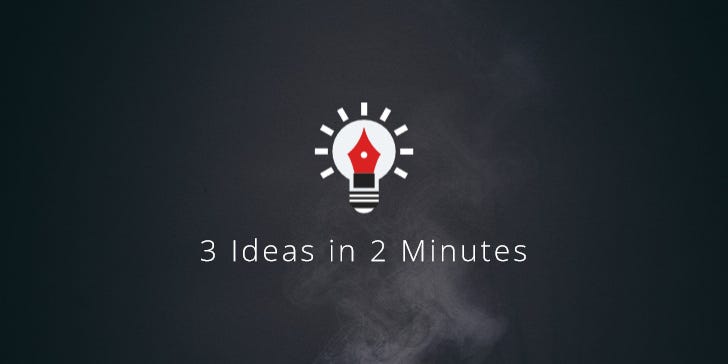#217: Absence of Evidence, Negativity Bias & Russell's Teapot
3 Ideas in 2 Minutes on Lacking Evidence
I. Absence of Evidence
Is the Absence of Evidence evidence of absence? Not necessarily. Senior lecturer in intelligence analysis Charles Vandepeer explains:
Depending on the problem, the absence of evidence is not necessarily the evidence of something not occurring. A useful question to ask is, ‘What is happening above or below the “threshold of detection”?’ or ‘What can I reasonably expect not to see in the information, even if it is occurring?’
The scale of the problem can be useful in determining the significance of an absence of evidence. Following on from the previous example of confirming if a country is mobilising for war, the absence of evidence of mobilisation is significant because we are talking about a large-scale event. If they were mobilising, we would expect to see some evidence of it, regardless of how much they were trying to hide it.
In contrast, the absence of evidence of a terrorist attack being planned does not provide this level of confidence because it is on a much smaller scale. Further, recent history has highlighted the difficulty in attempting to detect plans for terrorist attacks.
—Charles Vandepeer, Applied Thinking for Intelligence Analysis
II. Negativity Bias
That won’t work. It’s too risky. We tried it before and it failed. It’s a waste of time.
Sometimes, the absence of evidence is mentally reframed as evidence of something bad. Even when the absence is only due to limited information.
Negativity Bias is our brain’s tendency to give more weight to such negative experiences, information and emotions than to positive ones of equal intensity. We remember criticism more than praise. We notice threats faster than opportunities. We let a single terrible event outweigh several pleasant ones.
Apparently, this has evolutionary roots: Being highly sensitive to danger increased our ancestors’ chances of survival. Today, Negativity Bias can lead to caution or pessimism. If your brain naturally prioritises the negative, balancing it requires deliberate effort:
Let’s see how we can make it work. If we plan well, we can manage the risks. We learned a lot from last time — let’s try with improvements. Our time could pay off if we stick with it.
III. Russell's Teapot
According to British philosopher Bertrand Russell, simply believing something because it has not been disproven isn’t a smart move. Case in point is Russell’s Teapot:
If I were to suggest that between the Earth and Mars there is a china teapot revolving about the sun in an elliptical orbit, nobody would be able to disprove my assertion provided I were careful to add that the teapot is too small to be revealed even by our most powerful telescopes. But if I were to go on to say that, since my assertion cannot be disproved, it is an intolerable presumption on the part of human reason to doubt it, I should rightly be thought to be talking nonsense.
If, however, the existence of such a teapot were affirmed in ancient books, taught as the sacred truth every Sunday, and instilled into the minds of children at school, hesitation to believe in its existence would become a mark of eccentricity and entitle the doubter to the attentions of the psychiatrist in an enlightened age or of the Inquisitor in an earlier time.
—Bertrand Russell, Is There a God?
In other words, the burden of proof is on those who make unfalsifiable claims.
👉 If you think you’ve heard that before, you may have read my article on Carl Sagan’s fire-breathing dragon and his Baloney Detection Kit. 🐘
Have a great week,
Chris
themindcollection.com

